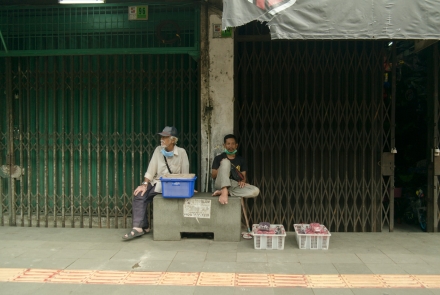
Photo by Rio Lecatompessy on Unsplash
What has hampered Indonesia’s COVID-19 response?
Indonesia’s pandemic measures have been challenged by a lack of co-operation between regional and central governments, Hafiz Noer writes.
Trust in government is essential, particularly during a global health crisis, but unfortunately, it is thin on the ground in Indonesia. There has been a clear lack of consistency among government institutions in delivering key messages, and a series of bureaucratic problems have hampered Indonesia’s COVID-19 mitigation plans.
Regional governments have stepped in, and have focused on stringent virus measures, rather than on buttressing a health system overwhelmed by the surging number of patients and with only a limited number of beds in designated hospitals, a problem that comes down to the central government. The Governor of Jakarta, Anies Baswedan, has been among the most vocal of the regional leaders in the crisis, and has stepped into the spotlight because of his aggressive measures.
The central government’s inability to coordinate with regional governments can be traced back to its initial virus response. After Indonesia announced its first three COVID-19 cases in March, several regions immediately signalled their intention to implement their own lockdowns.
Anies was one of the regional leaders that requested such measures, as the capital has been Indonesia’s largest coronavirus hotspot throughout the crisis. However, his request then underwent a long process to be approved by the central government’s health minister, and the virus was spreading with every passing minute.
In fact, long before official cases were present in Jakarta, as early as January, Anies told the central government that he had been monitoring for the deadly virus. But his strategy was neglected by the health ministry, which claimed action was unnecessary, as Jakarta had no positive cases.
The central bureaucracy’s process impacted Anies’ ability to execute his policies immediately. In fact during the initial virus response, six of Anies’ policies were outright rejected by the central government in just the month of March.
Because the city is the heart of economic and political activity of the country, the governor’s response to the crisis has been widely reported, fuelling speculation he will run for president.
His immediate and assertive virus response have been broadly popular, unlike the inconsistent public perceptions of Indonesian President Joko Widodo.
However, this doesn’t mean that Anies’ policies were enough to curb the spread of the virus, or were free from criticism. During the initial response for instance, his decision to limit public transport hours created long queues of people and no social distancing measures were enforced. This caused a flood of criticism from the public.
Still, given the ways it failed to coordinate with regional governments, most public criticism has been directed toward the central government. In part, it has come from Indonesians through social media, using a hashtag translated as #IndonesiaWhatever.
This criticism was most intense after the relaxation on the travel ban and other government blunders, like an opening of business operations that led to a new cluster in 68 offices in Jakarta.
The anger revealed Indonesian frustrations towards the government’s response and further challenged the already low public trust in central government.
While Anies appears to have increased his popularity, the effects on his electability in a presidential election are still unclear. Four years is a long time in politics.
This is the president’s last term, and some feel that without cause to push for re-election public health has not been his top priority.
The government currently seems to be focusing on helping the economy recover instead of a public health response, and Indonesia’s economic ministers are playing significant roles in the new committee that dismissed the previous national task force on COVID-19 at the expense of public health officials.
On top of that the government is now concerned with the discussion on several controversial bills, including an omnibus foreign investment law designed to ‘speed up’ Indonesia’s economy.
If the president can work to bring together central and regional government together to enforce stringent measures, it’s possible Indonesia could maintain enough national solidarity to keep fighting the onslaught of the virus.
In a pandemic, humanity needs to be the supreme commander of public policy. Indonesia’s economy will recover as the virus abates, and demand will gradually crawl up as cases fall, but without strong political leadership, many more people will die. Whether that will come from regional leaders, or the central government, remains to be seen.
Updated: 23 July 2024/Responsible Officer: Crawford Engagement/Page Contact: CAP Web Team












